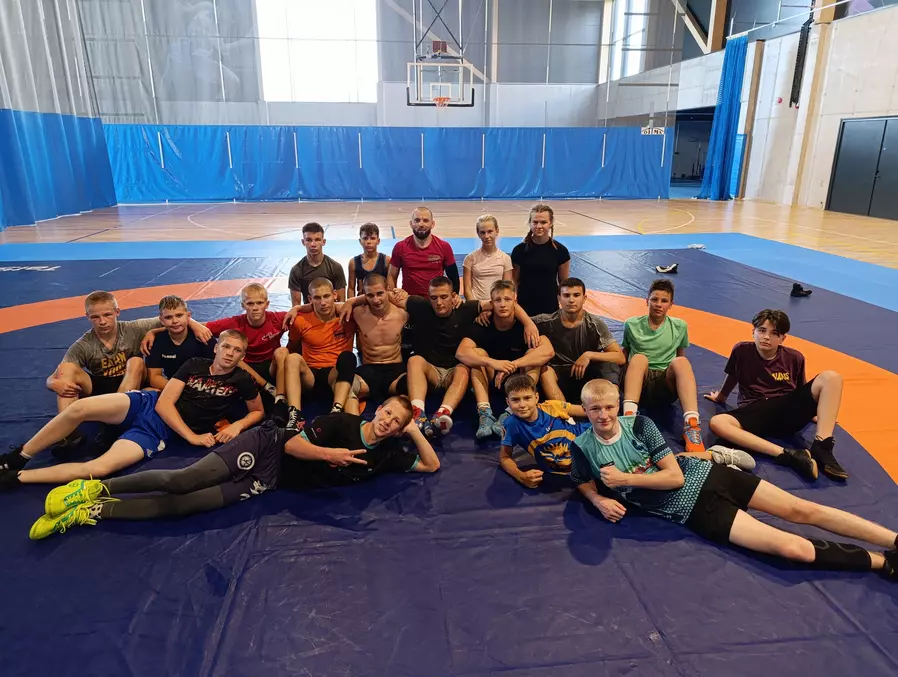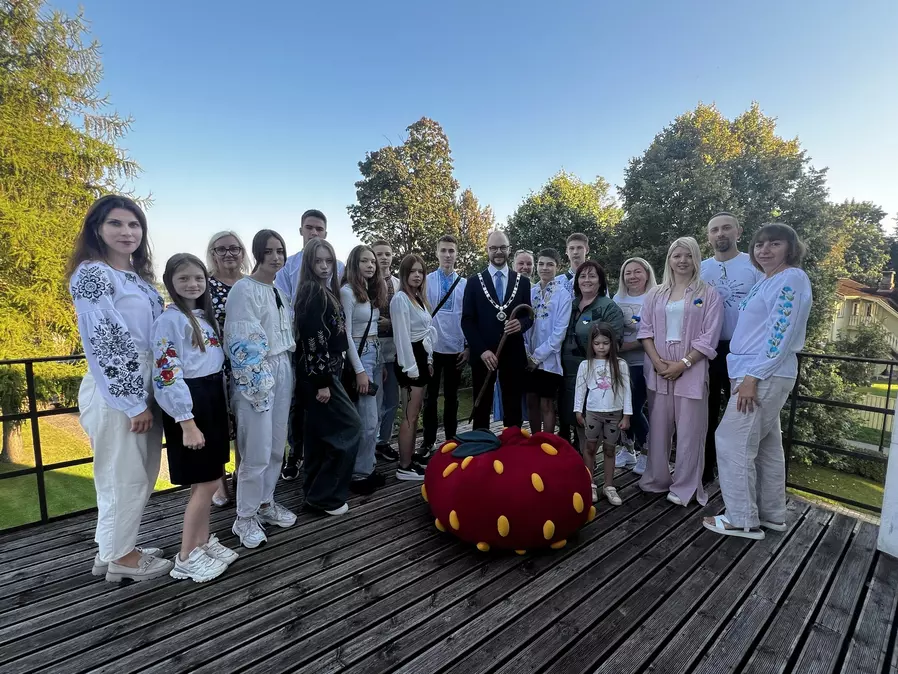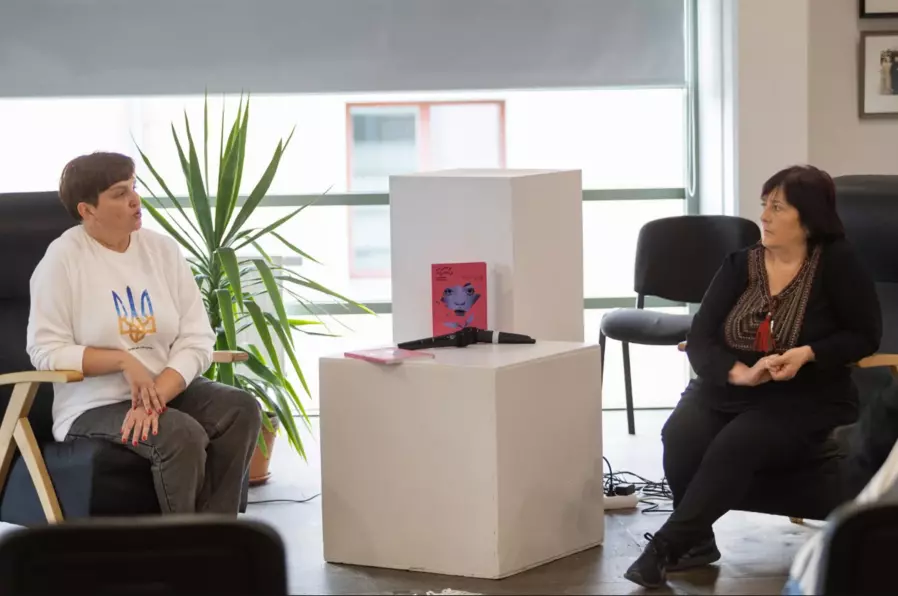Open Estonia Foundation´s activities to support Ukraine (2022 -2024)
Since Russia's aggressive invasion of Ukraine, the Open Estonia Foundation (OEF) has supported Ukraine through various initiatives, ranging from educational programs for Ukrainian children to providing mental and physical health support for war refugees. The OEF’s core values have always been centered on human dignity, freedom, and respect for human rights, including minority rights. For this reason, it is of utmost importance to support and assist Ukrainians who have endured immense suffering due to the war.
Supporting the Mental and Physical Health of Ukrainian Children and War Refugees
In 2024 the Open Estonia Foundation launched a project aimed at supporting the mental and physical well-being of Ukrainian children and war refugees currently residing in Estonia. The project is funded by the European Economic Area (EEA) and Norway Grants Bilateral Relations Fund.
In June 2024, as part of this project, OEF organized a sports camp in a small Estonian island called Hiiumaa for Ukrainian children. The camp provided them with an opportunity to relax and train alongside Estonian athletes. The children were coached by professional trainers, who were themselves Ukrainian refugees. The shared language helped to better understand and address the children's needs. The camp’s comprehensive program included wrestling, boat trips, tennis, volleyball, and other team games, which contributed to their physical and mental recovery. As a result, the children not only enjoyed a well-deserved break but also enhanced their mental and physical health during the camp.
Sports camp for Ukrainian refugee children in Hiiumaa.
In early September, in cooperation with Estonian NGO Headuse Tartu, we organized a trauma camp for ten displaced children from Ternopil, held in the small Estonian town of Viljandi. The 7-day camp aimed to support their physical and mental health through sports activities, field trips, and mental health exercises. The children were accompanied by two teachers who received trauma management training. Professional sports coaches and trauma therapists were involved in both the planning and implementation of the project.
Children from Ternopil meeting the major of Viljandi (Photo: NGO Headuse Taru)
Additionally, we held two public presentations of the book Жити попри все (To Live Despite Everything), which tells 11 stories written by Ukrainian women who, as a result of the war, have experienced the loss of loved ones and homes, Russian occupation, captivity, sexual violence, and more. Alongside the raw accounts of war and trauma, these stories illustrate how individuals can find ways to help others, contribute to victory in different ways, and simply refuse to give up. The stories cover experiences from both 2014 and 2022. The authors are women of various ages from different regions of Ukraine. The book was initiated by the NGO Eastern Ukrainian Center for Civic Initiatives, which has been documenting human rights violations related to the war in Ukraine since 2014. We are currently seeking funding to translate and publish the book in Estonian, English, and Russian.
The authors of the book “Жити попри все”, Olena Nimakihhina and Nataliya Logozynska, are telling their story at the book presentation in Viljandi. Olena currently lives in Moldova and she is the founder of the Ukrainian clothing brand Velna. Nataliya is currently living in Viljandi, Estonia and is actively helping other Ukrainian refugees. (Photo: Marko Saarm, Sakala)
We also organized a cooking class for Ukrainian refugees with disabilities residing in Valga, a small town in South-Estonia. The cooking class was conducted by Ukrainian refugees living in Estonia. Watch the video here:
In addition to promoting the mental and physical well-being of Ukrainian refugees, the OEF has launched several other initiatives to support both refugees and children since the beginning of the war in 2022.
Below are a few examples of our activities:
After Russia launched its aggressive war in February 2022, Putin's army began occupying Ukrainian territories. Ukrainians living in occupied areas were often forcibly deported to Russia, a process that was frequently violent. Ukrainians, including children, were placed on buses and sent to filtration camps. These camps subjected individuals to degrading procedures, such as forcing pregnant women to undress in front of their children and undergoing humiliating inspections. Many were left without documents or any means of survival.
The Open Estonia Foundation (OEF) has long supported Russia’s pro-democracy opposition and civil society, placing us in a unique position to help Ukrainians deported to Russia.
In March 2022, the first refugees deported to Russia began leaving the country through our network. OEF helped organize the evacuation of Ukrainian refugees from Russia and facilitated their reception and assistance in Estonia. Since March 2022, over 2,000 deported Ukrainian refugees have been successfully evacuated, the majority being mothers with children. Approximately a quarter of the evacuees were children.
One of the families we assisted included a mother, grandmother, and two daughters aged 14 and 17 from Mariupol. The father and grandfather stayed behind to fight for Ukraine. Despite being a minor, the elder daughter was forced to go through filtration. Once they arrived in Estonia, the young woman shared her harrowing experience in a video. To protect her relatives still living in occupied Mariupol, we anonymized her voice and concealed her identity. The information we gathered on Russian filtration camps was shared with human rights organizations and the UN.
Every refugee’s story is filled with tragedy, hardship, and resilience. In April 2022, a young woman from Mariupol, Julia Pavlyuk, reached out to us for help. She had been pregnant with her second child when Russian bombing destroyed her home and her husband’s documents. After surviving the siege and the humiliations of filtration, Julia, her husband, and their child were forcibly sent to Russia’s Far East. Fearing that their newborn child would be denied Ukrainian citizenship, they decided to leave Russia, despite the fact that Julia’s husband lacked documentation.
Our team quickly organized an evacuation for Julia and her child, arranging their flight from the Far East to St. Petersburg. Volunteers then helped escort the family to the Estonian border, where we provided them with accommodation, essentials, and medical care. Julia’s husband was later evacuated to Ukraine via Belarus with help from our network, allowing the family to reunite. Julia gave birth to a second child, who was granted Ukrainian citizenship. Watch the video with Julia and her husband here:
In Estonia, Ukrainian families with children were welcomed by volunteers in Narva and housed at the Ingeri House. OEF, in cooperation with other organizations, supported the shelter’s operations from March to August 2022, when the influx of refugees from Ukraine was at its peak. A full overview of the shelter's work with Ukrainian refugees can be found here:
Educational Projects for Ukrainian Children
Many Ukrainian refugees in Estonia were temporarily housed aboard the ferry Isabelle, which accommodated around 2,000 people, including 600 children. One of the biggest challenges for refugee families was creating a sense of normalcy for their children while awaiting enrollment in Estonian schools. During this transition, there was an urgent need for structured leisure programs.
We established a leisure center that operated weekdays from 10 a.m. to 5 p.m., regularly hosting about 40 children aged 4-10, with a total of 150 children participating in the activities. The center offered programs in robotics, fun science, drawing, clay modeling, chess, and natural sciences. More details on the leisure center’s work can be found in Appendix 1.
Qualified psychologists from Ukraine, trained in post-traumatic stress disorder (PTSD), worked with the children. Additionally, we supported an e-learning platform for Ukrainian children (https://teachersforukrainiankids.org/), which has been running for two years. The platform is staffed by volunteer teachers from 36 countries, but Ukrainian refugee teachers are also paid, allowing them to continue their work during this challenging time. The platform has served 1,000 Ukrainian children, with 266 teachers participating.
Gifts for Ukrainian Children
We organized several initiatives to help alleviate the traumas Ukrainian children faced and to bring joy during difficult times. One of these was the distribution of Christmas gifts during the 2022-2023 holiday season. Known as “Secret Santa,” the project allowed children to submit their gift wishes and receive exactly what they dreamed of. Over 300 Ukrainian children received gifts through this initiative.


